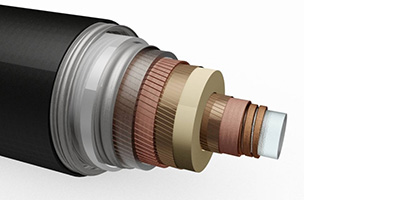14 April 2025
Superconductivity for electricity transmission
Assessment of superconducting cables and lines as an additional tool to address future congestion and capacity challenges.
Context / Why this project
Superconductors enable the transmission of electricity with almost 100% efficiency because of their unique superconductive properties. These superconductive materials have a specific temperature, known as the “critical temperature”, below which their electrical resistance drops to zero.
Thanks to this property, superconductors have a few key benefits that make them potentially useful as a solution to build out the transmission grid.
Potential benefits of superconducting cables or lines
-
Significantly reduced space requirements (for same power capacity)At the same voltage level and power, superconducting cables take up to 1/20th of the space of overhead lines, or 1/5th of the space of underground cables.
-
High power capacity at low(er) voltagesDue to the absence of losses in superconductors, these have high power capacities even at lower voltages.
-
No electromagnetic fieldWhen including superconducting shielding in the cables, superconductors do not have an external electromagnetic field.
-
No temperature dependenceThanks to active cooling, there is no temperature dependence of the cables or lines, allowing them to be run at their maximum capacity for 100% of the time.
However, these benefits come at the cost of additional technical complexity in terms of the cooling system, as well as a higher overall cost. Furthermore, superconducting cables or lines are not yet widely used as a component of the high-voltage transmission grid.
This project aims to evaluate the benefits of the technology to determine its suitability for the transmission grid and to identify a location for the initial Proof-of-Concept.
Approach
The assessment itself is divided in two major aspects: a technology assessment and a business case assessment followed by a go/no go for a Proof-of-Concept.
-
Technology assessmentWithin this assessment, we will identify the current state-of-the-art, key players and potential partners. Followed by a deep-dive into the key characteristics of superconducting transmission cables and lines.
-
Business case assessmentBuilding on the technology assessment, the business case evaluation will be performed to compare the cost-effectiveness of superconducting transmission cables and lines against traditional advanced solutions. This evaluation will include identifying specific locations where superconducting cables could be more cost-effective based on various quantitative and qualitative criteria. For these locations, a high-level business case assessment will be conducted.
Following this phase, we will determine whether a more detailed assessment for one of the locations as potential Proof-of-Concept is warranted.
How to get involved?
Currently, we are performing the technology and business case assessment and welcomes any input on both the technology and its potential applications.
If you are interested in participating or have any questions on this topic, don’t hesitate to contact us!




